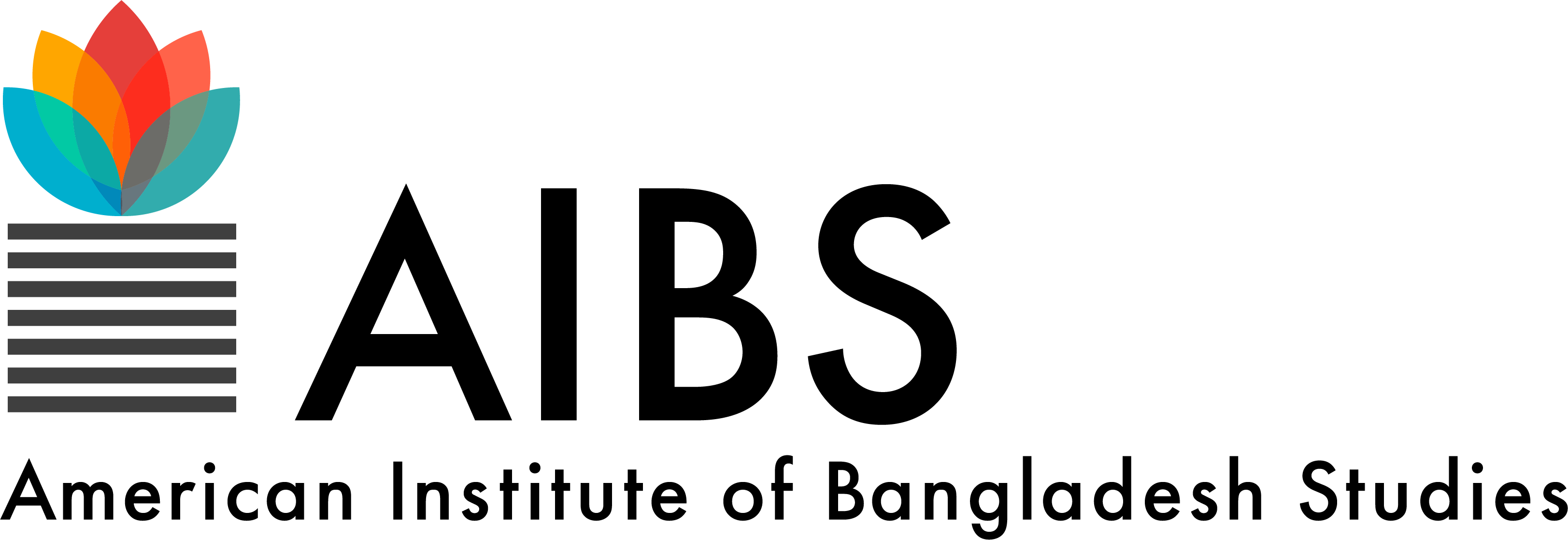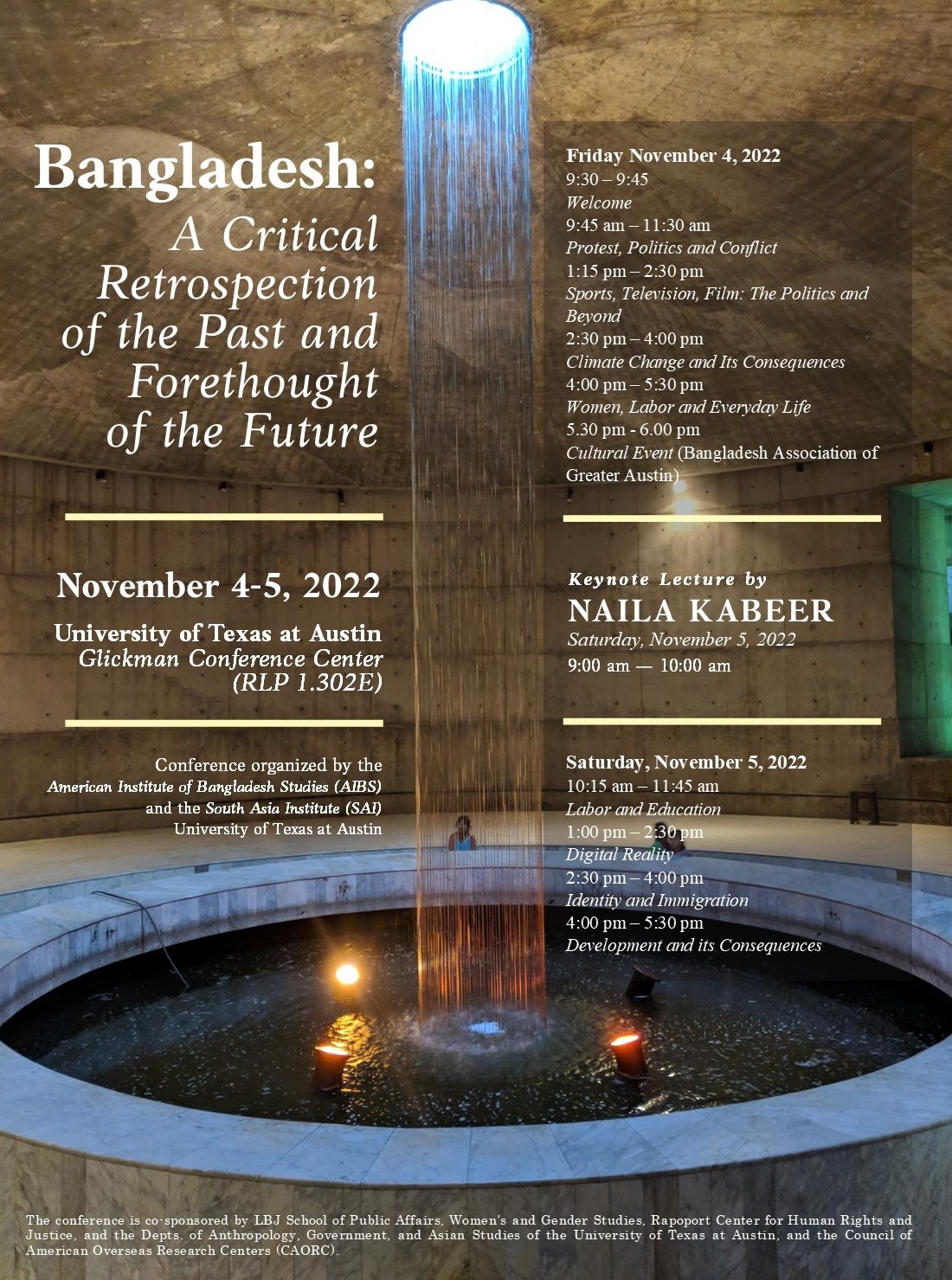Bangladesh: A Critical Retrospection of the Past and Forethought of the Future
Bangladesh: A Critical Retrospection of the Past and Forethought of the Future
An In Person Conference, November 4-5, 2022
University of Texas at Austin
The American Institute of Bangladesh Studies (AIBS) and the South Asia Institute at the University of Texas at Austin will hold a conference on Bangladesh, focusing on the past fifty years and the ways forward. The in-person conference is scheduled on Friday 4 November and Saturday 5 November 2022.
Deadline for submission of proposal has passed. Authors of accepted proposals will be informed via email. The program will be announced by early October.
Keynote Speaker
Professor Naila Kabeer
Department of Gender Studies
London School of Economics and Political Science
Accommodation
The South Asia Institute has reserved a limited number of rooms for conference participants at a discounted rate at the Hampton Inn Austin University / Capitol hotel (address: 1701 LAVACA STREET, AUSTIN TX 78701) for November 3 and 4, 2022.
The discounted rate is $199 (plus tax) per night. Conference participants can get this rate by calling 800-446-6677 or booking online (link) to reserve a room. When booking a room by phone, please mention that you are with the AIBS conference and UT Austin South Asia Institute.
Schedule
Friday November 4, 2022
9:30 – 9:45 Welcome
Dr. Sharmila Rudrappa, Director, South Asia Institute, University of Texas at Austin
Dr. Ali Riaz, President, American Institute of Bangladesh Studies
9:45 am – 11:30 am Protest, Politics and Conflict
Chair: Neil DeVotta (Wake Forest University, USA))
Social media hate speech in political communication: A critical analysis of Bangladesh (Priyanka Kundu, University of Illinois at Chicago, USA).
The Politics of General Amnesty in Bangladesh (Mohammad Sajjadur Rahman, Clark University, USA).
Mujib’s two bodies: Memorial populism and enforced amnesia in Bangladesh (Julian Kuttig, Ghent University, Belgium).
The 2018 Road Safety Protest in Bangladesh: How a student crowd challenged (or could not challenge) the repressive state (Nafisa Tanjeem, Worcester State University, USA).
The Political Economy of Conflict over the Farakka Barrage (Rokeya Aktar, University of Bath, UK).
11:30 am – 1:00 pm Lunch
1:15 pm – 2:30 pm – Sports, Television, Film: The Politics and Beyond
Chair: Rebecca Manring (Indiana University at Bloomington, USA)
Going global: A survival strategy for the new Bangladeshi cinema (Fahmidul Haq, Bard College, USA and Anis Rahman, University of Washington, Seattle).
Mindless propaganda or thoughtful persuasion? Television commercials and broadcast regulations in Bangladesh (Md. Harisur Rahman, North South University, Bangladesh).
Conquering the master’s game: The decolonization of cricket in Bangladesh (Md. Saidur Rahman, University of Toronto, Canada).
2:30 pm – 4:00 pm – Climate Change and Its Consequences
Chair: Jason Cons (University of Texas at Austin)
Revisiting child health in the face of climate change: A study about the effects of temperature rise and precipitation changes on child health in Bangladesh (Monir Hussain, The University of Alabama at Birmingham, USA).
Climate change and indigenous communities in Bangladesh: Impact and adaptation. (Ekhtekharul Islam, Independent University, Bangladesh).
Environmental degradation in Bangladesh: The impacts of foreign direct investment, output volatility, energy consumption and housing (Riva Das Gupta, University of Chittagong, Bangladesh).
Rainwater harvesting to improve water security, education and climate change adaptation (M. Rafiqul Islam, Verona University, Italy).
4:00 pm – 5:30 pm – Women, Labor and Everyday Life
Chair: Erin Lentz (University of Texas at Austin)
CSR failures in Bangladeshi Apparel Industry: An agency theory perspective (Rahnuma Siddika, University of Illinois at Urbana-Champaign, USA).
Refugee women’s agency: The invisible participation of Rohingya women in everyday life-making in the camps of Bangladesh (Shafinaz Sameen, Military Institute of Science and Technology, Bangladesh).
Socio-economic and cultural factors affecting job performance of female teachers at primary level in Bangladesh (Khan Hoque, Jagannath University, Bangladesh).
A household in crisis: The predicament of live-in domestic workers caring for aging employers (Marshall Azad McCollum, University of Washington, USA).
Cultural event 5:30 – 6:00 (Bangladesh Association of Greater Austin, TX)
Dinner – 6:00 – 7:30 (For participants only)
[Sponsored by the Journal of Governance, Security and Development, Centre for Governance Studies (CGS), Bangladesh]
Saturday November 5, 2022
9:00 am -10:00 am
KEYNOTE LECTURE
Unruly sons, compassionate daughters: reconfiguring the inter-generational contract in Bangladesh.
Professor of Gender and Development at the Department of International Development, London School of Economics and Political Science, UK.
10:15 am – 11:45 am Labor and Education
Chair: Kamran Asdar Ali (University of Texas at Austin).
Education in Bangladesh: Secularity and social cohesion (Samia Huq, BRAC University, Bangladesh).
Labor market discrimination in Bangladesh: Experimental evidence from the job market of college graduates (Sibbir Ahmad, Michigan State University, USA).
Building tolerance through education policy: Rethinking inclusion in the narratives of “Bangladeshi” identity (Reshmi Chowdhury and Mehnaaz Momen, Texas A&M International University, USA).
Precarious migrant: Labor, emotions and ideology (Taimur Reza, University of Chicago, USA).
12: 00 pm – 1:00 pm Lunch
1:00 pm– 2:30 pm Digital Reality
Chair: Rachel M. McDermott (Barnard College).
How intelligentsia, media became tools of cultural hegemony for an autocracy in Bangladesh (Abu Taib Ahmed, Colorado State University, USA).
Mechanisms and motivations of digital authoritarianism: The case of Bangladesh (Fahmida Zaman, University of Delaware, USA).
The changing nature of Bangladeshi terrorist organizations and the role of digital media (Md. Saimum Parvez, Vrije Universiteit Brussel, Belgium).
The downward spiral impact of draconian legislation (Washik Muhammod Istiaq Ezaz, Independent University, Bangladesh).
2:30 pm – 4:00 pm Identity and Immigration
Chair: Ahmed Shamim (University of Texas at Austin).
Media system of Bangladesh: Slowly moving in the direction of authoritarianism (Md. Khadimul Islam, Wayne State University, USA).
The process of reunification of Bangladeshi families initiated by women immigrated to Italy and the UK (Shahanaz Parven, RUDN University, Russia).
The interconnected spaces of producing refugeehood of the Rohingyas in Bangladesh (Sharif Wahab, Indiana University Bloomington, USA).
Understanding Rohingya crisis (Sayema Khatun, University of Wisconsin-Milwaukee, USA).
4:00 pm – 5:30 pm Development and its Consequences
Chair: Sharmila Rudrappa (University of Texas at Austin).
Traffic nightmares and infrastructure dreams: Dhaka, the ‘unliveable’ city (Shehzad Arifeen, University of Texas at Austin, USA).
Challenges to development interventions in Bangladesh: The aftermath of COVID-19 outbreak (Md. Ismail Hossain, Shahjalal University of Science and Technology, Bangladesh and Md Saiful Islam, University of Alabama, Birmingham).
The shock of global south megacities: Contextualizing Dhaka’s urban past, present, and future (Samantha Christiansen, University of Colorado, USA).
International brokerage, access to external rents, and civil-military relations in Bangladesh (Md. Muhibbur Rahman, University of Texas at Austin, USA).
5:30 pm – 5:45 pm Vote of Thanks
Dr. Sharmila Rudrappa, Director, South Asia Institute, University of Texas at Austin.
Dr. Ali Riaz, President, American Institute of Bangladesh Studies.
KEYNOTE SPEAKER
Dr. Naila Kabeer is Professor of Gender and Development at the Department of International Development, London School of Economics and Political Science. Previously she was Professor of Development Studies at the School of Oriental and African Studies (SOAS) at London University, and Professorial Fellow at the Institute of Development Studies, Sussex. She has served as a consultant to various national and international organizations. Her research focuses on various aspects of inequality and how they play out within households, labor markets and the wider economy. Dr. Kabeer’s recent publications include Organizing women workers in the informal economy: beyond the weapons of weak (Zed Press, 2013).
CONFERENCE ORGANIZERS
The American Institute of Bangladesh Studies (AIBS) is consortium of institutions of higher learning in the United States aimed at promoting scholarly understanding between Bangladesh and the United States (https://aibs.net/) . This is the only umbrella organization in the United States that brings together universities working on and about Bangladesh. Currently, 25 universities are members of the AIBS. AIBS has also signed memorandums of understanding for cooperation with 25 Bangladeshi universities. AIBS is a member of the Council of American Overseas Research Centers (CAORC). CAORC is a private not-for-profit federation of 22 independent overseas research centers that promote advanced research, particularly in the humanities and social sciences, with a focus on the conservation and recording of cultural heritage and the understanding and interpretation of modern societies.
The South Asia Institute (SAI) was established in 2003 as part of a University of Texas at Austin initiative to promote South Asian programs, especially those pertaining to contemporary issues, across the entire University and in the larger community. As a National Resource Center for South Asia funded by a Title VI grant from the U.S. Department of Education, the Institute sponsors major conferences, scholarly symposia and a South Asia Seminar each semester. The Institute also provides Foreign Language and Area Studies fellowships to students pursuing graduate degrees relating to South Asia in any department or school of the University. Additionally, the Title VI grant also provides resources for outreach programs to K-12 schools, post-secondary institutions, business and civic organizations, and the Texas community at large.
The conference is co–sponsored by
LBJ School of Public Affairs, Women’s and Gender Studies, Rapoport Center for Human Rights and Justice, and the Depts. of Anthropology, Government, and Asian Studies of the University of Texas at Austin, and the Council of American Overseas Research Centers (CAORC).



